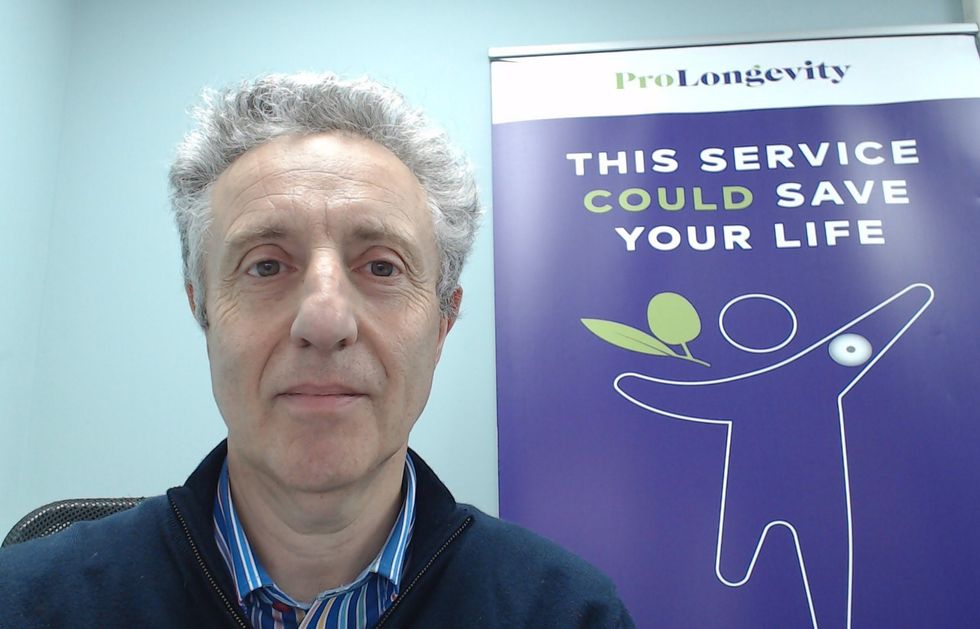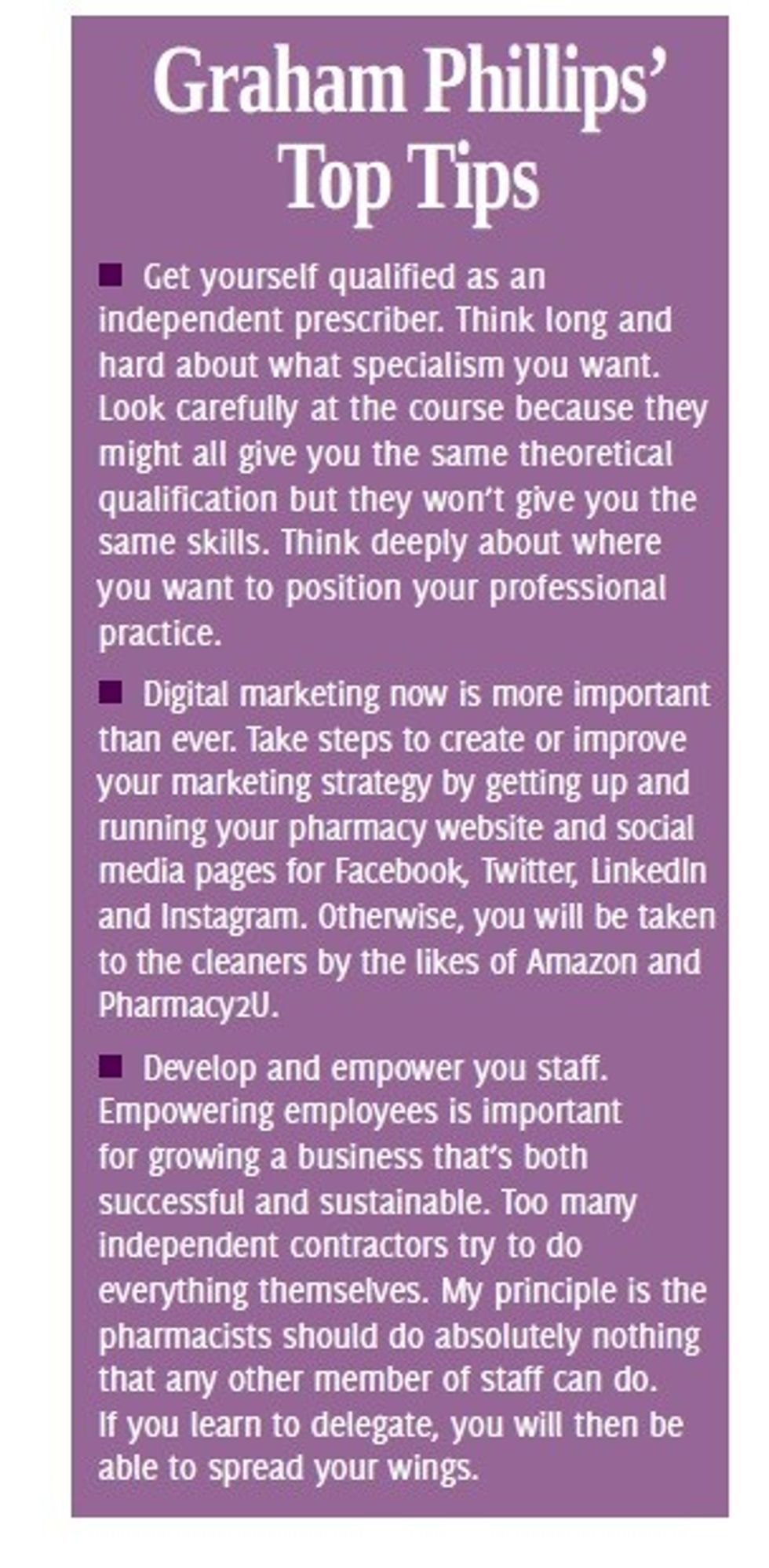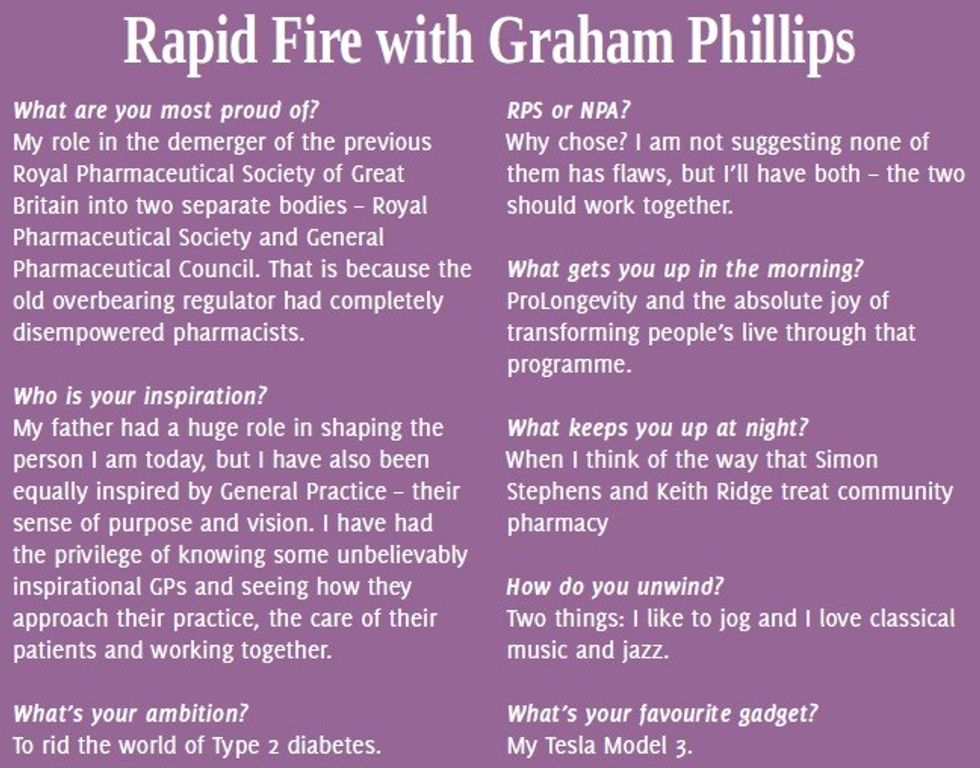Graham Phillips, the winner of Pharmacy Business Public Health Pharmacist Award 2020, talks about how his innovative ProLongevity programme is helping people lead healthier and happier lives. He spoke with Priyankur Mandav…
Graham Phillips likes to call himself ‘the pharmacist who gave up drugs’. A second generation pharmacist in his 39th year in the profession, his first memory of pharmacy dates back to early childhood when used to help his father (a community pharmacist himself) make up some 'mist magtrisil' powder with pestle and mortar. Graham was six or seven years old then.
“What inspired me to follow in my father’s footsteps was how the community he served would treat him. They held him in such an incredibly high esteem, calling him Dr Phillips – he had a PhD so he truly was a Doctor whereas in medicine “doctor” is an honorary title.
“He was always “clinical” in his pharmacy practice so I was brought up in “clinical pharmacy” so to speak, and the community benefitted from his ready answer for all their minor ailments. He even used to provide informal prescription advice to the local GPs.
“He was not only doing a lot of social good but was also making a reasonable living. Decent income, some sort of social validation and a degree of altruism; it seemed as though my father embodied the best of the profession in the most beautiful way. There was nothing not to like.”
Graham worked as a ‘Saturday boy’ in his dad’s pharmacy while still in high school – doing everything from making a cuppa to cleaning the toilet.
He qualified as a pharmacist in 1982 from the School of Pharmacy in London and spent his pre-reg year training at Kingswood Chemists, which eventually became part of LloydsPharmacy.
“Kingswood’s training those days was simply outstanding. Terry Silverstone (a pharmacy veteran and currently chief executive at Kingston & Richmond LPC) was the superintendent pharmacist who gave us – students – an enormous amount of time, he was so generous. We remain firm friends till date.”
Graham’s growing interest in extended roles within the profession led him to undertake a post-graduate diploma in clinical pharmacy from the School of Pharmacy, King’s College in 1997.
Perhaps inspired again by his father’s academic pursuits – ‘Dr Phillips’ did his PhD researching into the drug 'loperamide' which was destined to become Imodium – Graham developed a “teaching pharmacy” concept, similar to a GP Teaching Practice, in collaboration with the School of Pharmacy, University of Hertfordshire, where he still enjoys practice and research links.
This association, along with his long term interest in public health, would result in the publication of a paper on the role of community pharmacy in Type-2 diabetes – one that would, in turn, set him up on a lifelong journey into the wonderland of lifestyle and nutrition.
Fixing the roof
A member of the Healthy Living Pharmacy reference group, Graham was also involved with NHS cancer-reform strategy and sat on the board of the National Obesity Forum. His Manor Pharmacy Group, which once had as many as 10 pharmacies, has won numerous local and national awards, including ‘Leader of the Year’ at the 2012 Pharmacy Business Awards.
When asked what he thought about the profession, Graham said he regrets how the community pharmacy sector has always allowed itself to be “misportrayed” as a bunch of retailers and businessmen without much clinical interest.
“When things were good, we didn’t make the investment in our future. As a profession we never fix the roof when the sun is shining.”
However, he thinks the NHS is primed for a structural change and therefore pharmacy will get another chance. “If we play it right and leverage everything we have achieved from Covid, that creates the best opportunity we have had for 30 years.”
What’s ProLongevity
Graham was heavily influenced by what Hippocrates had in mind when he famously said: “Let food be thy medicine, and let medicine be thy food.” The Greek founder of western medicine did not see food and medicine as separate things, and his writings reflect that nutrition and lifestyle were right at the centre of his thoughts.
“After years as a practising community pharmacist, I reached the conclusion that this ‘pill for every ill’ approach isn’t actually healthy. Nor is it financially sustainable for the NHS,” Graham said.
His answer was a diabetes prevention treatment plan he founded – ProLongevity, which addresses the root cause rather than trying to suppress the symptoms. The programme can reverse Type-2 diabetes and prediabetes and also help with a host of health problems including polycystic ovary syndrome, dementia and some cancers.

Typically, patients receive personalised, one-to-one coaching from a health professional coach who will give them guidance that is completely tailored to their individual circumstances, needs and preferences.
After the first meeting with their coach, the patient will receive their first continuous glucose monitor. The sensor communicates with a free-to-download app on the patient’s smartphone. The app sends real time data to a secure server to which both patient and coach will have full access.
Throughout the journey the coach will be responsible for analysing the patient’s blood sugar readings and will develop specific guidance on what foods are having a negative effect on their blood sugar and suggest alternative foods (plus optional exercises) that they still enjoy but won’t cause a sugar spike.
Prevention agenda
“One of the things I always say when I talk to health professionals is once you’ve seen this with your own eyes, you can’t unsee it. It’s just impossible for me now to go and practice in the conventional way that I used to.
“Nowadays whenever I’m working on the frontline in the pharmacy, I feel like I’m handing out statins and anti-hypertensives, anti-diabetics, and all the time I’m thinking we’re looking through the wrong end of the telescope. The money is there in the system, if only we spent more on “prevention” and less on “cure”.
“We could fix it if only we invested in preventive public health and ate real food. All of us as health professionals are trained as follows: await the development of symptom, then make a forlorn attempt to suppress them, one by one, using the drugs on the basis of evidence.
“We know that people are getting fatter and more diabetic by the day. We are all born into this milieu of escalating metabolic disease. But no one looks at the natural history of it, tracks it and thinks what’s the root cause, which is, of course, the cause of the journey I’ve been on and it’s been a fascinating one.
“But I tell you what, I’m bloody angry now because I realise I was practising the wrong way for most of my professional career. I’ve been duped, we’ve all been duped, health-professionals and patients alike.”
Will Graham’s drug-free programme ever come to community pharmacies?
“The short answer is yes,” he says, “but there is a need of a paradigm shift in terms of our food choices, for a start.
“I am currently coaching some independent pharmacies on the programme and they ultimately can become providers. But I will only offer it to people who are prepared to go through the pain of properly understanding the programme."
Mental shift
Graham was also influenced by Canadian dentist Weston A Price who embarked on a world tour in the 1930s to observe traditional diets around the globe. Dr Price found that people who were still eating their traditional diet free from processed foods had few cavities, their faces were broader, and they didn’t suffer from crowded teeth.
Dr Price noted that their overall health was way better than those who had adopted a diet of processed food. He concluded that teeth indeed were a window to what was happening in the rest of the human body.
“ProLongevity is not about a diet, (there’s no calorie counting, for example) it’s a paradigm shift to a new way of living that is healthier and better and one that you’d continue to live with for the rest of your life.
“The microbiome (the colony of 100s of trillions of bugs in the human gut) has a huge effect in our system. One way to be less hungry and to secrete less insulin is to completely cut the carbs out. The trouble is that a lot of people struggle with it. One of my clients said: ‘If it is a choice between eating the bread and taking the metformin, I’ll carry on with the drug and eat the bread.’ It’s a fair choice. He’s a guy in his 80’s and he’s entitled to make that choice.
“I’d like to ban the word ‘diet’ from the lexicon because it implies feeling hungry and deprived. That’s why no diets work after the initial three months because you are fighting your own natural physiology. Put simply, what makes you fat is being hungry and if you are not hungry you won’t be fat anymore.”
Precision nutrition
“Many of our treatments are symptomatic: the medication doesn’t treat the problem. It simply masks the symptoms. Stop the medication and the problem comes back. This is true for blood pressure medication, statins for cholesterol, diabetes treatments and much else besides.
“What ProLongevity is trying to achieve is a longer and healthier life. So I went back to the basic science I’d learnt all that time ago at university and looked for the root causes of our problems.
“It turns out that lifestyle is key: a long and healthy life is at least 80 per cent lifestyle and less than 20 per cent genetic. How fantastic is that?”
Graham still works as a pharmacist on the frontline and has to routinely hand out drugs.
“Like most health professionals I have had my own health journey. It was steeped in the perceived wisdom – eat a little less, move a little more, fats make you fat, and so on. I spent years avoiding red meat, having everything low fat and therefore high in sugar and found myself hungrier and hungrier and simultaneously fatter and fatter.”
Because of this Graham moved into the field of precision nutrition – a discipline that evaluates an individual’s DNA, microbiome, and cardio-metabolic response to specific foods or dietary patterns to determine the most effective eating plan to prevent or treat disease.
Precision nutrition can precisely tailor diabetes management by looking closely at how one’s microbiome is related to the intake and metabolism of certain nutrients, which can predict how a how a person’s body would respond to a specific diet, discovering types of gut bacteria that help to improve blood glucose control.
Perhaps it’s time he changed his nom de plume to "the pharmacist who gave up drugs to fix his patients’ blood glucose". What say, Graham?














